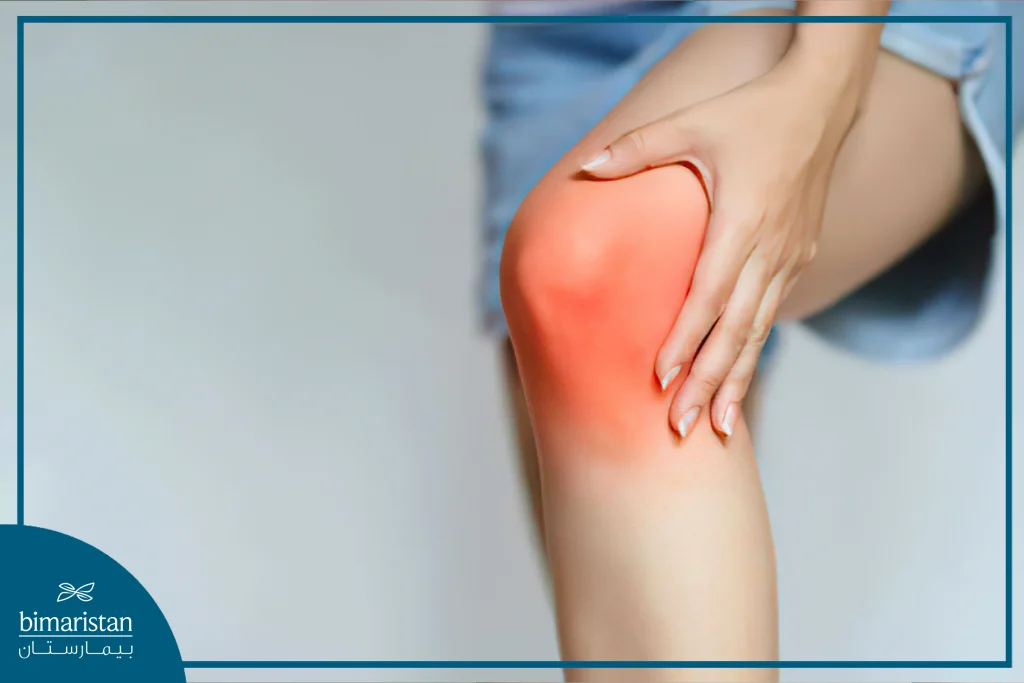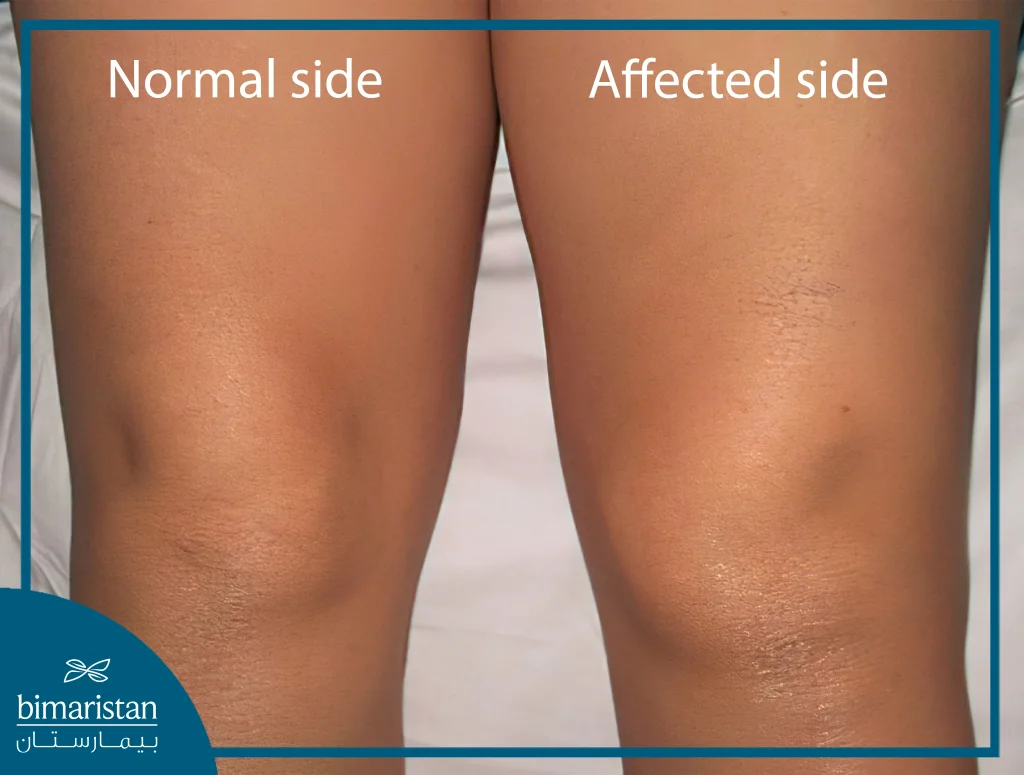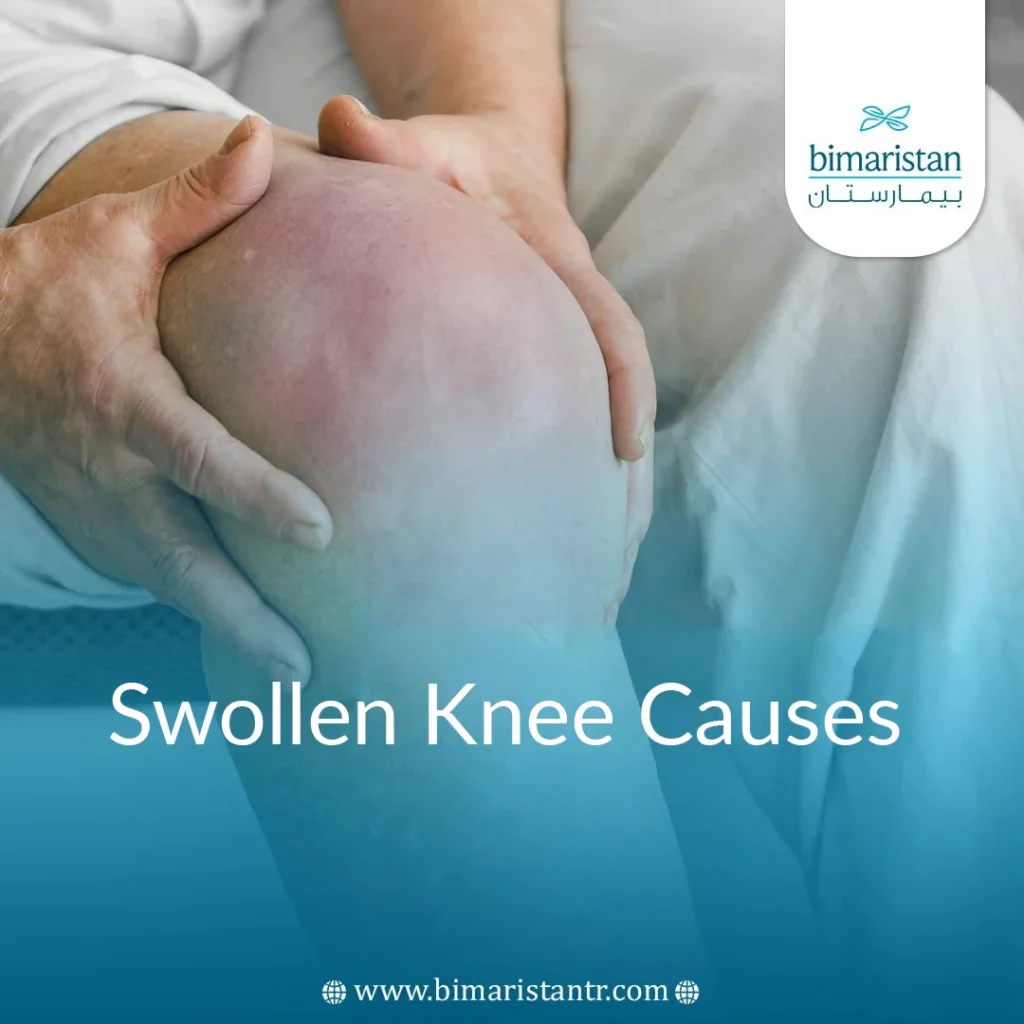Swollen knee is one of the common problems that affect one or both knees due to the accumulation of fluids inside the joint. Learn about the causes of swollen knee and how to treat them.
Swelling in your knee can occur for various reasons and conditions. It may be attributed to many pathological causes, such as rheumatoid arthritis or gout, or it may occur due to an accident or a direct injury to the knee.
The treatment of the condition primarily depends on identifying the causes of swollen knee, as determining the cause is the first step in treatment. Undoubtedly, swelling can cause troublesome symptoms for those who suffer from it, and these symptoms are not limited to the external appearance of the knee alone, as this medical problem can cause severe pain and difficulty in movement. Follow along to learn about the causes of swollen knee and treatment methods.
What are the causes of swollen knee?
Knee swelling and inflammation can be attributed to the excessive accumulation of fluids around or inside the joint. These fluids accumulate for many reasons, including injuries that provoke an inflammatory response leading to fluid accumulation around the affected knee. Other causes include knee cartilage tearing and fluid leakage.
Swelling is a common symptom of many joint and body diseases. Knee swelling may be due to one of the following reasons:
Osteoarthritis of the knee joint
Osteoarthritis is among the most common causes of swollen knee in older adults. This disease causes cartilage erosion in the knee due to increased pressure on the joint, which, over time, leads to erosion and damage to the joint structures, resulting in fluid leakage and accumulation in the joint. This condition most commonly occurs in overweight or obese older adults.
Swelling is usually accompanied by pain and stiffness in the knee.
Causes of degenerative knee arthritis:
- Age: advancing age is the most common factor, as cartilage becomes less flexible and less capable of repair over time.
- Obesity: excess weight puts additional pressure on the knee joint, accelerating cartilage wear and tear.
- Previous injuries: old knee injuries, such as fractures or ligament tears, can contribute to the development of arthritis in the future.
- Genetic factors: some individuals may have a genetic predisposition to developing arthritis.
- Overuse of the joint: repetitive movements and overuse can strain the joint and speed up cartilage deterioration.
Symptoms of knee osteoarthritis:
Knee pain: Typically worsens with physical activity and may improve with rest.
Joint stiffness: patients may experience stiffness in the knee, especially in the morning or after prolonged sitting.
Joint swelling: swelling around the knee may occur due to inflammation.
Difficulty moving: patients may find bending or extending the knee difficult.
Crease or cracking sounds: A patient may hear creaking or cracking sounds when moving the knee.
Treatment of degenerative knee arthritis:
There is no cure for degenerative arthritis, but there are many options available to relieve symptoms and improve quality of life:
- Lifestyle changes: losing excess weight and avoiding activities that cause pain can help alleviate symptoms.
- Physical therapy: specific exercises can strengthen the muscles around the knee and improve the range of motion.
- Medication: Pain relievers and anti-inflammatory drugs can reduce pain and inflammation.
- Injections: corticosteroid or hyaluronic acid injections into the joint can relieve pain and improve movement.
- Surgery: in severe cases, knee joint replacement may be an option to relieve pain and improve function.
- Consultation with a doctor is essential for proper diagnosis and treatment of degenerative knee arthritis, as treatment may vary depending on the severity of the condition and symptoms.
What is knee degeneration?
Osteoarthritis is among the most common causes of swollen knee with pain in older adults.
This condition causes the cartilage in the knee to wear down due to increased stress on the joint, which leads to the deterioration and damage of joint structures over time, resulting in fluid accumulation in the joint.
This disease most often occurs in older individuals who are overweight or obese. The swelling is usually accompanied by knee pain and stiffness.

Gout
Gout is a among the most common causes of swollen knee. The patient suffers from swelling and redness in the joint accompanied by severe pain that comes in intermittent attacks. Gout can affect all joints, including the foot and knee. Read more about Gout in the knee.
Torn knee cartilage
This injury is often seen in athletes and is one of the most common causes of swollen knee. The human knee contains cartilage called the meniscus, which is prone to injury and tearing when a person, especially an athlete, experiences a sudden twist in the foot and leg. For more information, click on torn knee cartilage.
Knee tendonitis
The knee joint consists of a group of tendons that connect the muscles to the bones to ensure smooth movement. However, these tendons are at risk of inflammation when stressed, which in turn is a cause of knee inflammation and swelling. You can get more details about knee tendonitis.
Knee fractures
Bone fractures are one of the important causes of swollen knee. When you notice sudden swelling immediately after an accident, like falling from a high place, the underlying cause of the swelling may be Knee fractures.
Torn knee ligaments
Ligaments work to connect bones, and the anterior cruciate ligament (ACL) in the knee is one of the strongest ligaments in the body, which connects the thigh bone to the shinbone (tibia). However, it is prone to tearing and rupture during sports activities that require quick changes in direction and repeated jumping, making it one of the common causes of knee swelling in basketball players.
Rheumatoid arthritis
Rheumatoid arthritis is a common inflammatory condition in women that causes swelling in the knee joint. This disease can affect several joints in the human body and causes many symptoms. Get more information about rheumatoid arthritis symptoms in women.
(Baker’s cyst (swelling behind knee
Baker cyst, also known as a popliteal cyst, is a buildup of fluids in the back part of the knee. It may be accompanied by pain and discomfort and usually forms as a result of joint problems and diseases, such as knee joint inflammation or tearing in one of the menisci.
Synovial inflammation in the knee
The normal knee contains a fluid-filled sac called the synovial bursa, which acts as a lubricating cushion between the tendons and bones to prevent friction during movement. However, it is prone to inflammation, especially with excessive stress on the joint.
Diagnosis of knee swelling causes
The doctor conducts a comprehensive evaluation of the patient and asks about their medical history in detail. Then, the doctor performs a physical examination to detect signs and symptoms that may help identify the causes of swollen knee.
Your doctor may use some tests to determine the causes of knee swelling, including:
X-rays
X-rays are used to exclude fractures and bone abnormalities and detect signs of joint inflammation that cause swelling. Additionally, ultrasound and magnetic resonance imaging (MRI) are useful in ruling out ligament and tendon problems.
Joint fluid aspiration
This is done by using a needle to withdraw a sample of fluid from the swollen area. The sample is then sent to the laboratory for special tests and analyses to detect the causes of swollen knee.

How to treat knee aching and swollen
Treatment methods vary depending on the causes and severity of the swelling and the patient’s health condition. Some of the most essential treatment methods include:
Home treatment for knee swelling
Resting and avoiding strenuous activities, applying ice to the swollen area, and elevating the knee can help reduce pain and swelling. Elevating the knee reduces blood flow to the injured area, reducing the severity of knee joint inflammation.
Applying pressure around the swollen joint also helps treat inflammation by using bandages or braces around the knee. Care should be taken not to wrap the bandages too tightly, as they may have side effects such as increased swelling and pain.
Pain relief accompanying aching swollen knee can easily be achieved by taking over-the-counter anti-inflammatory medications such as ibuprofen.
Swollen knee treatment through exercises
Special exercises in physical therapy help improve knee joint function and strengthen its muscles, allowing for better joint movement and reducing swelling. In some cases, a physical therapist may recommend using a knee brace.
Treating knee swelling through plasma injection
This is one of the modern and promising methods for treating various joint diseases. Human plasma has proven effective in treating knee osteoarthritis, relieving arthritis pain, and other diseases. Read more about plasma injection for the knee.
Treating knee swelling by fluid aspiration
One effective treatment for swelling is removing accumulated fluids from the knee joint using a specialized needle. However, this does not treat the underlying problem causing the swelling but is merely a temporary treatment. It may also diagnose the causes of swelling by examining the fluid in the laboratory.
Knee arthroscopy is also beneficial in treating swelling. It is a tube equipped with a light and camera inserted through a small surgical incision. It is used for surgical procedures and to repair damaged tissues in the knee joint.
In conclusion, there are many diverse causes of swollen knee, and it is essential to know them well so that the person can treat the problem effectively. The cause of swelling may be various diseases such as gout or arthritis, or it may be unrelated to these diseases and simply be an accident or injury to the knee. Therefore, it is always preferable to consult an orthopedic specialist to diagnose and treat the causes of swollen knee properly.
References:



